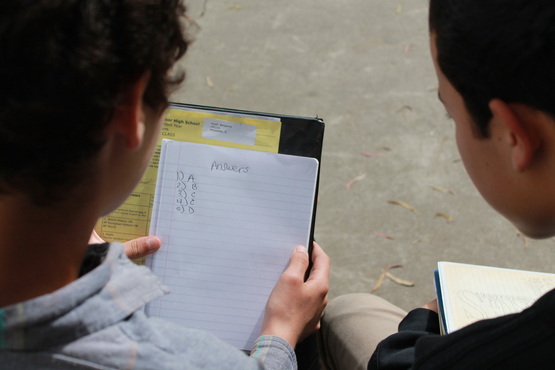Conner DiPaolo
Copy Editor
In today's educational system, schools limit students' potential by forcing a circular block into a square mold. The system tries to make students get the grade, the admission letter, the job, while completely ignoring the importance of actual learning.
Teachers have stopped the thought process in the classroom. “Learning,” or at least a school's definition of it, is more of a game than a quest for knowledge. To advance a level, a student needs to complete a certain amount of busy work with no true value besides putting points in the grade book, get the teacher to like him or her, and learn tricks that make the regurgitation of knowledge, not the knowledge itself, easy. The journey to learning, or learning itself, cannot be taught from a book or a kindergarten level assignment. Real learning is experienced. Real learning is absorbed by the mind, rather than force-fed.
The main problem with the school system, at least in America, is that the emphasis is the objective and not the process. Sure a lab in chemistry or a math test may give points for the work, but overall the teacher cares (as reflected in a grade) more about the answer. The objective, even in a test or assessment, is to meet certain criteria. Students that improve greatly over the year but score poorly on assignments or tests should be the ones that get an A.
Teachers should implore their students to find what they like and pursue it, granted they have basic knowledge of the things needed to survive in a business environment. There is no point for a person interested in health to take a “health” class. Anybody truly interested with the way the conditions the body needs to perform it's best would likely have researched enough to surpass the knowledge of any person in a entry level high school health class.
Similarly, people pursuing higher level knowledge should not be barred from classes they want to take because they haven't taken some of the prerequisites. The school system is not protecting a person from a bad grade if they sign up for a class that is too advanced, they are simply trying to protect themselves from bad publicity and ratings. A student, for example, that wants to take IB/AP Physics but won't be in calculus should just be asked to display a basic knowledge of elementary physics and calculus. Setting limits doesn't help anybody.
In the end, the school system cheated itself. Students don't learn anymore. Grades are a commodity, something that can be traded or acquired through text message with the answers to last night's homework. To create a nation of adults who are competent and long for knowledge, change must start with schools. Teachers have to put the process of learning above the objective, minimal state standards.
Copy Editor
In today's educational system, schools limit students' potential by forcing a circular block into a square mold. The system tries to make students get the grade, the admission letter, the job, while completely ignoring the importance of actual learning.
Teachers have stopped the thought process in the classroom. “Learning,” or at least a school's definition of it, is more of a game than a quest for knowledge. To advance a level, a student needs to complete a certain amount of busy work with no true value besides putting points in the grade book, get the teacher to like him or her, and learn tricks that make the regurgitation of knowledge, not the knowledge itself, easy. The journey to learning, or learning itself, cannot be taught from a book or a kindergarten level assignment. Real learning is experienced. Real learning is absorbed by the mind, rather than force-fed.
The main problem with the school system, at least in America, is that the emphasis is the objective and not the process. Sure a lab in chemistry or a math test may give points for the work, but overall the teacher cares (as reflected in a grade) more about the answer. The objective, even in a test or assessment, is to meet certain criteria. Students that improve greatly over the year but score poorly on assignments or tests should be the ones that get an A.
Teachers should implore their students to find what they like and pursue it, granted they have basic knowledge of the things needed to survive in a business environment. There is no point for a person interested in health to take a “health” class. Anybody truly interested with the way the conditions the body needs to perform it's best would likely have researched enough to surpass the knowledge of any person in a entry level high school health class.
Similarly, people pursuing higher level knowledge should not be barred from classes they want to take because they haven't taken some of the prerequisites. The school system is not protecting a person from a bad grade if they sign up for a class that is too advanced, they are simply trying to protect themselves from bad publicity and ratings. A student, for example, that wants to take IB/AP Physics but won't be in calculus should just be asked to display a basic knowledge of elementary physics and calculus. Setting limits doesn't help anybody.
In the end, the school system cheated itself. Students don't learn anymore. Grades are a commodity, something that can be traded or acquired through text message with the answers to last night's homework. To create a nation of adults who are competent and long for knowledge, change must start with schools. Teachers have to put the process of learning above the objective, minimal state standards.

 RSS Feed
RSS Feed